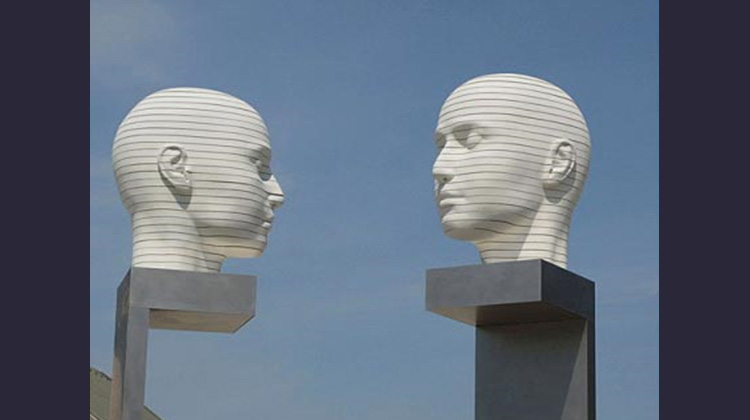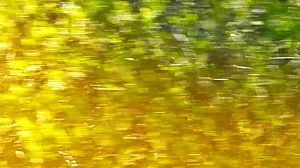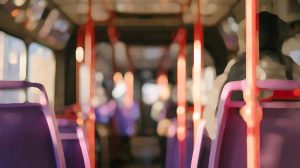
I asked Lukas to translate Der Spiegel for me so I could read the German murder trials without missing any details. The victims were mostly women, the murderers, men. Sometimes the victims were children, but even then it was usually a female child. Every week, it seemed, another one went missing.
Is it that we’re easier to misplace or replace, I asked Lukas, scanning an article in the “last seen alive” section, the freeze frame of a convenience store or a midnight bus shelter, a blurred figure in the white haze of an ATM.
Don’t be gruesome, said Lukas.
He was a good teacher, if slightly impatient with my grammar, particularly, my disregard for gendered articles. He quietly corrected my pronunciation as I read the obituaries out loud. I remember at that time I still couldn’t hear the difference between shon (soon) and schön (beautiful). In the second one, the vowel is longer, Lukas said. As in: she had a beautiful personality (schön). She died too soon (shon).
Listen for it. You’ll hear it.
After a while I did.
He once confessed that he wished he could return to Berlin, pre-unification, just for a day, even a few hours, to see what it was like to live in a divided city. When we moved in together, he insisted on renting a place in the former eastern district. He found a ground floor flat that was still heated by coal. The coal burner stood in the corner of the living room, a magnificent machine, the size of an upright bear. We never had the opportunity to use it, though, because we left before the winter, moving to another neighbourhood in the south west of the city. After we moved out, the flat was converted into a café.
I stopped by this café on my last visit to Berlin two years ago. I sat beside the coal burner, which was now kept purely for decoration. They’d re-painted the living room walls and there was a piano where our small pink couch had been. The server counted out my change, dragging the coins across the counter with an unpainted fingernail. I lived here once, I told her. She didn’t respond. Perhaps she hadn’t heard me or I hadn’t spoken clearly enough. Or perhaps she was tired of people approaching her and confessing that they had, at some point or another, lived in her café before it had become a café. Several people, sitting in my former bedroom, looked up from their laptops.
It had not been a good idea to return here, to a place where I had once been happy. It is never a good idea to return to such places.
I stirred my coffee three times, took a sip, and then left. Outside the trees smelled the same. The corner store still sold the orange juice I liked.
During the years I lived in Germany, Lukas and I would spend our summer weekends beside the lake. I would lie on a northern bank of Müggelsee with my feet in the water. Lukas would sit beside me under a broad sunhat, editing his thesis on differential geometry. He did not like swimming. He was, in fact, a weak swimmer, but he’d accompany me to the lake obligingly, though he rarely looked up from his book.
Crater-shaped, bordered by forests and reeds, Müggelsee is the largest of the lakes that surround Berlin. On weekends in July, its beaches are taken up with naked sunbathers. This, I found out, is a tradition inherited from Soviet times. Old photographs in the DDR museum reveal entire naked families running towards the water. The joy on their faces amidst the iron curtain memorabilia seems almost obscene. And yet, Lukas pointed out, who is not happy beside a lake in July?
Müggelsee means either Lake of Graves (mogyla) or Lake of Fog and Drizzle (mighla). Lukas told me this while paging through his thesis, which was laid out before him on the beach. I lay in the shade watching him trace his equations, like delicate jellyfish, across the pages of his notebook. He double-checked each proof. He tapped his pencil on the sand. This was an afternoon that repeated itself during the time we knew each other. He studied; I read, or graded my students’ English assignments, or added a few more scratches to my notebook.
If I called to him from the water he’d look up. I was not sure if he loved me. Sometimes I was sure, but other times, I had doubts. Maybe I gave too much weight to those doubts. When they grew overwhelming, I’d dive into the lake and swim to the center and back. This helped.
I imagined her body, dragged up from the lake, undamaged, not even bloated yet, still a perfect human body. It seemed to me that there should be a way to reinsert breath into her lungs, to intercept her spirit as it made its exit through the lake’s green surface.
The following day we saw her face in the paper. She was 36. Originally from Munich. Blonde eyebrows and a nose ring, round flaring shoulders like mine. She had lived in Berlin for less than a year, working at a restaurant near the central train station and commuting from Pankow, a northern suburb. Why am I surprised by her life’s ordinariness?
An apartment in Pankow. A weekend at the lake.
A few days after her death, more details of her life emerged. She’d been taking evening classes in hospitality management. Her younger brother was due to visit her later that month. She regularly attended salsa-dancing classes. She would arrive alone and dance with the instructor.
Actually, I made the last part up. I don’t know if she liked to dance or not.
I no longer live in Berlin. During a brief trip back to the city, and against my better judgment, I visit Lukas, who, if I am honest, I’m still in love with. I don’t tell him this though. I suspect that he knows. Instead I ask him about the woman, who, so many years ago, drowned while we were at the lake.
Do you remember? She was drowned by her boyfriend.
Boyfriend, in German, is simply “friend,” Freund. They make no linguistic distinction between lover and friend; the meaning is implied by context. So what I actually said was, She was drowned by her friend.
No, he says. It was a stranger.
Are you sure?
The man was unknown to her, he insists. We could look it up.
But neither of us does. It does not seem important enough, and besides, what difference would it make to the woman who drowned, who was drowned, all those years ago.
If she were alive, I say, she would be almost forty by now.
In Germany, missing or murdered women who have not been identified are referred to as Erika Mustermann. Erika was found at the bottom of a lake in Brandenburg. Erika was discovered beside a garbage dump with her legs broken. Erika spent her childhood chained to a fence in her stepfather’s backyard. Erika was last seen on Canada’s highway of tears.
It was around the time of the drowning, the summer of 2013, that I stopped trusting men. Women were being murdered every hour, every minute even, and men were responsible for it. The ultimate plan, it seemed to me, was to eradicate women from the earth. I don’t mean to exaggerate. I was convinced. I saw the intention in the eyes of the men I passed on the street. I even recognized it in Lukas, a kind of cruelty in his voice, when he criticized me for reading too many obituaries and neglecting the political section of the newspaper. Our deaths are political, I told him.
You spend too much time on the details, he said. You’ll make yourself sick.
Lukas said that he imagined that the moon would be a lot like Antarctica, a place he planned to travel to. It would be remote and cold, but life was certainly possible with the right equipment. If I lived there, on the moon, he meant, he promised to visit.
At some point, I’m not sure when, I began to associate their faces with the dead women in the news. They stared at me, expressionless, and then split apart into 23 thin slices of fiberglass.
Now, thinking back on this night, I wonder why I was walking to the trains alone. We always left the library together.
During my last visit to Berlin I collected the things that Lukas had been safekeeping for me. Letters, clothes, a few books. My plan was to bring them back to Canada with me, but I would end up leaving them in a neat pile at a random train station in Berlin.
It would be the last time I’d see him, though I didn’t know it then. He walked me down the stairs and through the courtyard, helping me with my clothes and books, which he’d stored for me in a blue IKEA bag.
I could say that I still loved you, he said. But how would that benefit us? What good would that do? It would not be practical.
He gave me my things and we stood for a few minutes in his doorway. I thought of how many times I’d stood there, with my own set of keys, how many times I’d rushed up the stairs to his one bedroom on the fourth floor, to discover him, hunched over his desk, reading. The surface of his desk was always strewn with what he’d explained were illustrations of a type of differential geometry called “Smooth Manifolds.” There was something sensual and frightening about them, the way they twisted into another dimension, a future that didn’t belong to us.
That evening, after leaving his place, I got on the wrong train. When I discovered my mistake, I got off in a forested area in the west part of the city and sat down on a bench. The eastbound platform was empty. My vision was blurring. I couldn’t feel my hands or my feet. I tried to collect myself. I took several books out of the IKEA bag, but I couldn’t read the words written in them. Their pages had turned into rivers. Even now I can’t recollect their titles.
Lukas had told me that he’d defended his thesis earlier that spring. Now he worked at the university’s mathematics archive, which was also located at the Schrödinger-Zentrum. I sat alone on the eastbound platform, trying to push his face out of my mind. I waited there for a long time alone. If a train passed, I did not hear it.
But as I waited I realized that I was not alone. I was certain there were others, figures in the dark: men with missing limbs, women carrying sacks of hair. I saw rats the size of dogs, climbing off the hot rails. They had nowhere to go to. They were heading to the forest. They were heading to the damp, grey-blue shores of Müggelsee.
As I sat down, I saw my reflection in the window, featureless, rubbed out, like the face of a drowned woman. And yes, before I looked away I did see her, the waitress from Munich with her light eyebrows and flaring shoulders. I was sure then that the man at the lake had not been a stranger. She had known him. She’d trusted him enough to follow him into that dark, cold element, to swim out to its center. As I would have. He had been a friend.





Marcella Edwards says
Frightening, fascinating and fearless – facing towards the dark while distilling from it some essential droplets of human light.
Janek says
Brilliant. Particularly relevant to South Africa where gender-based violence is rife; more-so during lockdown.